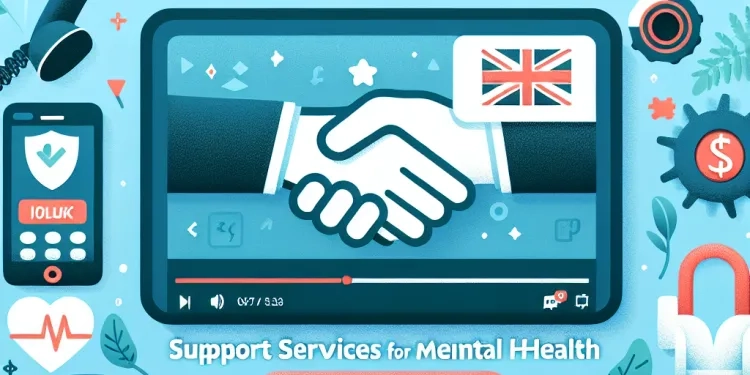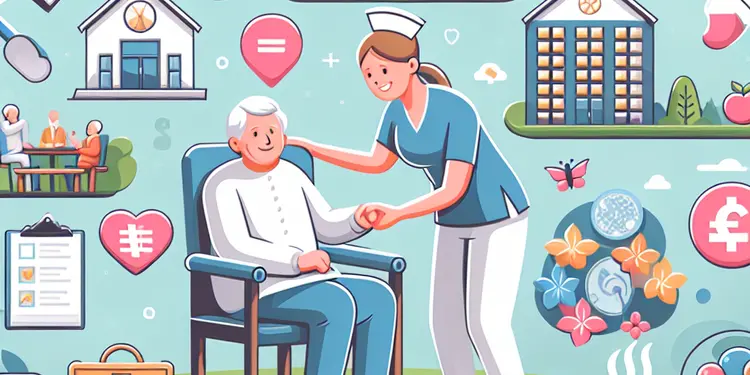Find Help
More Items From Ergsy search
-

NHS-led Provider Collaboratives: improving mental health, learning disability and autism services
Relevance: 100%
-

The NHS Long Term Plan for learning disability and autism
Relevance: 68%
-

Transforming Care for people with Learning Disabilities and/ or Autism: Peter's Story
Relevance: 58%
-

What is a learning disability?
Relevance: 49%
-

Harshi’s learning disability annual health check and health action plan
Relevance: 44%
-

Use of reasonable adjustments to reduce health inequalities for people with a learning disability
Relevance: 44%
-

Navigating Mental Health Services for Children and Adolescents
Relevance: 42%
-

Flu vaccinations for people with a learning disability
Relevance: 41%
-

Mental Health Support Services in the UK
Relevance: 40%
-

How are health services provided in prison?
Relevance: 39%
-

Current Challenges in Youth Mental Health Services
Relevance: 39%
-

Accessing cervical screening with the right support for people with a learning disability
Relevance: 38%
-

Support Services for Mental Health Amid Economic Uncertainty
Relevance: 36%
-

New Report Highlights Gaps in Mental Health Services for Welfare Recipients
Relevance: 35%
-

Mental Health Services Struggle to Cope Amid Record Demand
Relevance: 34%
-

Autism - My Story - Adrian | NHS
Relevance: 33%
-

Can people with autism lead independent lives?
Relevance: 32%
-

Mental Health Support Resources in the UK
Relevance: 32%
-

Mental Health Resources for Families
Relevance: 31%
-

NHS Unveils Revolutionary Mental Health Support Initiative
Relevance: 31%
-

How can families support a member with autism?
Relevance: 31%
-

How prevalent is autism?
Relevance: 30%
-

What is the autism spectrum?
Relevance: 30%
-

What services do care homes provide?
Relevance: 30%
-

Mental Health: Laura's Story | NHS
Relevance: 30%
-

Accessing Mental Health Support Resources in the UK
Relevance: 30%
-

SLaM's Suicide Prevention, Learning and Support Strategy
Relevance: 30%
-

What advice is available for parents concerned about autism risks?
Relevance: 30%
-

Can autism be cured?
Relevance: 30%
-

Tackling Youth Mental Health: Community Initiatives and Solutions
Relevance: 29%
-

Autism: Graeme's story | NHS
Relevance: 29%
-

How is autism diagnosed?
Relevance: 29%
-

Advancements in Mental Health Resources for Families
Relevance: 29%
-

Understanding Mental Health in Children
Relevance: 29%
-

How can early intervention help children with autism?
Relevance: 29%
-

Is there an autism test?
Relevance: 29%
-

New Mental Health Strategy Launched to Address Youth Anxiety Epidemic
Relevance: 28%
-

Mental Health Support for Families: Resources and Strategies
Relevance: 28%
-

Mental Health Support for Families: Resources and Helplines
Relevance: 28%
-

Mental Health Support Resources for Families
Relevance: 28%
NHS-led Provider Collaboratives: Improving Mental Health, Learning Disability & Autism Services
Introduction to Provider Collaboratives
The NHS-led Provider Collaboratives represent a transformative approach to delivering health care within the United Kingdom. These collaboratives focus on bringing together NHS trusts, local government, and the voluntary sector to collectively address and improve service provision. By working jointly, these groups aim to enhance care quality and efficiency, particularly within mental health, learning disability, and autism services.
Enhancing Mental Health Services
A significant focus of NHS-led Provider Collaboratives is the enhancement of mental health services. Through integrated efforts, the goal is to promote early intervention, provide comprehensive community-based care, and reduce the need for acute services. Collaboratives work to standardize treatment protocols, facilitate access to mental health resources, and support patients through coordinated care pathways, ensuring timely and effective support.
Support for Learning Disabilities and Autism
Individuals with learning disabilities and autism often require specialized and long-term care tailored to their unique needs. NHS-led Provider Collaboratives are dedicated to ensuring that these individuals receive personalized care that promotes their well-being and independence. Collaboratives focus on providing accessible services, enhancing community support, and integrating educational and social care services to support holistic development.
Benefits of Integrated Care
The integrated care approach of NHS-led Provider Collaboratives fosters a more cohesive healthcare system that emphasizes patient-centered care and optimizes resource use. This method enables a more seamless transition between services, reduces duplication, and ensures that healthcare providers can share best practices and innovations. This collaborative model leads to better health outcomes, improved patient satisfaction, and more sustainable healthcare services.
Conclusion
NHS-led Provider Collaboratives represent a significant advancement in ensuring that mental health, learning disability, and autism services in the UK are more effective, inclusive, and responsive to the needs of individuals. Through collective action and shared responsibility, these collaboratives are paving the way for a more connected and supportive healthcare environment that benefits patients and the wider community.
NHS-led Provider Collaboratives: Making Mental Health, Learning Disability & Autism Services Better
What Are Provider Collaboratives?
Provider Collaboratives led by the NHS are a new and better way to give healthcare in the UK. They bring together NHS trusts, the local government, and charity groups to work as a team. By working together, they want to make healthcare services better and work smarter. They focus especially on improving services for mental health, learning disabilities, and autism.
Improving Mental Health Services
One big aim of Provider Collaboratives is to make mental health services better. They want to help people early and give them support in their communities. This way, fewer people will need to go to hospitals for serious help. They work on making treatment the same everywhere. They also want to make it easier for people to get mental health resources. By working together, they make sure patients get the right care at the right time.
Helping People with Learning Disabilities and Autism
People with learning disabilities and autism need special care that fits their needs. Provider Collaboratives are making sure these people get the care they deserve. They want to help people live independently and happily. They make services easy to reach, give community support, and join up with schools and social care to help people grow in all areas of life.
Why Working Together Helps
When healthcare teams work together, it makes the system better and more focused on patients. It helps services fit together smoothly without wasting resources. Healthcare providers can share good ideas and new ways of working. This teamwork leads to healthier people, happier patients, and healthcare that can last for a long time.
In Summary
NHS-led Provider Collaboratives are a big step forward to make mental health, learning disability, and autism services in the UK better. By working as a team and sharing responsibilities, they are creating a more connected and caring healthcare system. This teamwork is good for patients and helps the whole community too.
Frequently Asked Questions
What are NHS-led Provider Collaboratives?
NHS-led Provider Collaboratives are partnerships among NHS providers, aimed at delivering specialist services such as mental health, learning disability, and autism services. These collaborations work to ensure that services are more integrated, efficient, and tailored to the needs of the community.
What services do NHS-led Provider Collaboratives focus on?
They focus on specialist services across mental health, learning disability, and autism, including inpatient care, community services, and support for those transitioning from inpatient care to community settings.
How do these collaboratives improve patient care?
By pooling resources and expertise, these collaboratives enhance the quality and accessibility of care, reduce waiting times, and ensure continuity of care for patients transitioning between services.
Who is involved in NHS-led Provider Collaboratives?
Participants include NHS mental health trusts, learning disability and autism service providers, local authorities, voluntary sector organisations, and service users and carers.
How are services coordinated in these collaborations?
Services are coordinated through shared governance structures, integrated care pathways, and joint decision-making processes to ensure seamless service delivery and improved outcomes for patients.
Can patients choose which provider they receive care from within a collaborative?
Generally, care is coordinated to ensure the best possible match between patient needs and provider capabilities. Patients and their families are involved in care planning to make informed decisions.
How do NHS-led Provider Collaboratives ensure quality and safety?
Quality and safety are maintained through rigorous monitoring, performance management, and the adoption of best practice guidelines. Collaboratives also engage service users and carers in evaluating service quality.
Are there any financial benefits from these collaborations?
Yes, collaboratives aim to reduce costs by improving efficiency and reducing duplication of services. Savings can be reinvested into front-line services to further improve patient care.
How do these collaborations impact local communities?
They provide more localised services, reducing the need for out-of-area placements, and increasing local capacity for mental health, learning disability, and autism services.
What role do service users play in Provider Collaboratives?
Service users and their carers are actively involved in governance, service design, and evaluation, ensuring that services are responsive to their needs and preferences.
Are there any specific targets or outcomes that collaboratives are measured against?
Collaboratives are measured against outcomes such as reduced waiting times, improved patient satisfaction, better continuity of care, and financial efficiency.
How do provider collaboratives integrate with primary care services?
Collaboratives work closely with primary care providers to ensure seamless transitions and continuity of care, providing specialist support when needed and facilitating early intervention.
What is the role of digital technology in Provider Collaboratives?
Digital technology is used for data sharing, telehealth services, and care coordination, helping to improve access to services and support integrated care pathways.
How are families and carers supported within these collaborations?
Families and carers are provided with information, resources, and support services, ensuring they are engaged in the care process and can advocate effectively for their loved ones.
What is the future of NHS-led Provider Collaboratives?
The future involves expanding and deepening collaboration, enhancing service integration, and continually improving care quality and patient outcomes through innovation and shared learning.
What are NHS-led Provider Collaboratives?
The NHS is the health care service in the UK. Sometimes, different NHS services work together to help people better. This is called a Provider Collaborative.
Here's how it works:
- NHS doctors, nurses, and other helpers work as a team.
- They share ideas and tools to make health care better.
- They help make sure everyone gets good care.
If you want to learn more:
- Ask a helper, like a parent or teacher, to explain.
- Use a computer or tablet to look up more information together.
- Watch videos about the NHS working together.
NHS-led Provider Collaboratives are teams of NHS groups working together. They focus on services for mental health, learning disabilities, and autism. These teams make sure the services work well together, are efficient, and fit what people need.
What do NHS-led Provider Collaboratives do?
NHS-led Provider Collaboratives work together to help people. Here are some things they focus on:
- They help people with their mental health.
- They offer support for people with learning difficulties.
- They provide care in the community.
Reading tip: You can use a tool like a ruler or your finger to follow each line. This helps keep your place while you read.
They help people with mental health, learning difficulties, and autism. This includes looking after people in hospitals, helping them in the community, and supporting them when they move from the hospital back to home.
How do these groups help patients get better care?
When people or groups work together and share their skills and resources, it makes care better and easier for everyone. This teamwork helps to make treatment quicker and makes sure people get the right care when moving between different services.
Who works in NHS-led Provider Collaboratives?
The people taking part are:
- NHS mental health groups
- Groups that help people with learning disabilities and autism
- Local councils
- Charity groups
- People who use the services and their carers
Tip: If you find reading hard, you can use a text-to-speech tool. It reads the words out loud for you.
How do these teams work together to share services?
Services work together using shared rules, plans, and teamwork. This helps give better care to patients and makes sure everything runs smoothly.
Can patients pick the doctor or nurse they want?
Yes, patients can pick their doctor or nurse in a collaborative care setting.
Here are some tips to help:
- Ask someone you trust to help you pick your doctor or nurse.
- Use pictures or symbols to show who you want to see.
- Ask lots of questions to make sure you feel good about your choice.
We work together to make sure you get the best care. We want to match what you need with what your doctor can do. You and your family help make plans so you can understand your choices.
How do NHS-led Provider Collaboratives keep things safe and good?
NHS-led Provider Collaboratives work together to make sure healthcare is safe and high quality. Here's how they do it:
- Teamwork: Different healthcare teams talk and work together. This helps them share the best ways to help patients.
- Check-ups: They regularly check how well things are going. If something can be better, they fix it.
- Training: They teach their staff new skills. This means everyone knows the best ways to care for patients.
Helpful Tools:
- For more information, you can ask a nurse or doctor to explain things.
- Use videos or pictures if they help you understand better.
- Ask someone to read information to you if you find it hard to read.
We make sure things are done right and are safe by checking them carefully, keeping track of how they are doing, and using the best ways to do things. Teams also ask people who use the services and their carers to help check if things are going well.
Here are some ideas that might help you understand better:
- Use pictures or diagrams to help explain what is happening.
- Ask someone else to read it with you and talk about what it means.
- Break down big ideas into smaller, easier parts.
Do we get money by working together?
Yes, working together helps make things cheaper. It does this by doing things better and not doing the same thing twice. The money saved can be used to make patient care even better.
How do these partnerships help local communities?
When people or groups work together, it's called a partnership. These partnerships can help local communities a lot.
Here are some simple ways they help:
- They can bring more jobs for people.
- They can make new places, like parks or playgrounds.
- They can help schools get better.
To understand this better, you can:
- Ask someone to explain it to you.
- Use pictures to see how it works.
- Watch a video about it.
They give help close to home. This means people do not have to go far away to get support. It helps more people nearby with mental health, learning disabilities, and autism.
What do service users do in Provider Collaboratives?
Service users are people who use the services. They help make services better.
In Provider Collaboratives, service users give ideas and share their experiences. This helps make sure the services meet their needs.
Service users can go to meetings and talk about what works well and what could be better.
It is important to listen to service users because they know a lot about what they need. They help make services more helpful and friendly.
To help understand and share ideas, service users can use pictures or easy-to-read documents. It is okay to ask for help if they need it, like getting support from a friend or a family member.
People who use the services and their helpers take part in making rules, designing services, and checking how well services work. This helps make sure the services are good for them and what they like.
How do we know if the team is doing a good job?
We check if the team meets their goals. Goals are things the team wants to do. This shows if the team is working well together.
Using pictures or charts can help understand if goals are met.
Collaboratives are checked by looking at results like shorter waiting times, happier patients, smoother care, and saving money.
How do care groups work with doctors and nurses?
Care groups are teams that help people get the health care they need. These groups can work with doctors and nurses in your local area.
Here is how they can work together:
- Care groups talk to doctors and nurses to help plan your care.
- They share important information about your health.
- They make sure you get the right help when you need it.
You or someone helping you can ask the care group and your doctor questions if you need more help. It's good to work together!
Teams work together with doctors and nurses to make sure care is smooth and connected. They help when special care is needed and step in early if there are any problems.
What does digital technology do in Provider Collaboratives?
Digital technology helps groups of health and care providers work together better. It makes sharing information easy. This means they can help people faster and improve care. Some tools can help, like:
- Video calls: To talk face-to-face without being in the same place.
- Emails and messages: To send information quickly.
- Online records: To keep all patient information safe and easy to find.
Using these tools can make everything work more smoothly. This means better care for everyone!
Digital technology helps people share information, have doctor appointments on the computer, and work together better in healthcare. This makes it easier for people to get the help they need and have all their care in one place.
How do we help families and carers in these groups?
Families and carers get help and information. They get tools and support to be part of the care team. This helps them speak up for their loved ones.
What Will Happen to NHS Provider Groups in the Future?
The NHS has groups of health providers that work together. These are called Provider Collaboratives.
This means hospitals, doctors, and clinics work as a team to help people better.
Let's think about what might happen to these groups in the future.
The groups want to make healthcare better and faster for everyone.
Some ways they might do this:
- Share ideas and plans.
- Work together on sorting out problems.
- Use new tools, like computers, to help them talk and plan.
People can use these tools to understand more:
- Visuals: Pictures can show how things work.
- Chats: Discussing with friends or family can help.
- Videos: Watching videos can explain things clearly.
The aim is to help everyone get good and fast healthcare.
The future means working together more and more. We will make sure services work better together. We also want to keep getting better at taking care of people. We will do this by trying new ideas and learning from each other.
If reading is tricky, try using tools that read text out loud. Taking breaks often can help too.
Useful Links
Have you found an error, or do you have a link or some information you would like to share? Please let us know using the form below.
-->
This website offers general information and is not a substitute for professional advice.
Always seek guidance from qualified professionals.
If you have any medical concerns or need urgent help, contact a healthcare professional or emergency services immediately.
Some of this content was generated with AI assistance. We’ve done our best to keep it accurate, helpful, and human-friendly.
- Ergsy carfully checks the information in the videos we provide here.
- Videos shown by Youtube after a video has completed, have NOT been reviewed by ERGSY.
- To view, click the arrow in centre of video.
- Most of the videos you find here will have subtitles and/or closed captions available.
- You may need to turn these on, and choose your preferred language.
- Go to the video you'd like to watch.
- If closed captions (CC) are available, settings will be visible on the bottom right of the video player.
- To turn on Captions, click settings .
- To turn off Captions, click settings again.
More Items From Ergsy search
-

NHS-led Provider Collaboratives: improving mental health, learning disability and autism services
Relevance: 100%
-

The NHS Long Term Plan for learning disability and autism
Relevance: 68%
-

Transforming Care for people with Learning Disabilities and/ or Autism: Peter's Story
Relevance: 58%
-

What is a learning disability?
Relevance: 49%
-

Harshi’s learning disability annual health check and health action plan
Relevance: 44%
-

Use of reasonable adjustments to reduce health inequalities for people with a learning disability
Relevance: 44%
-

Navigating Mental Health Services for Children and Adolescents
Relevance: 42%
-

Flu vaccinations for people with a learning disability
Relevance: 41%
-

Mental Health Support Services in the UK
Relevance: 40%
-

How are health services provided in prison?
Relevance: 39%
-

Current Challenges in Youth Mental Health Services
Relevance: 39%
-

Accessing cervical screening with the right support for people with a learning disability
Relevance: 38%
-

Support Services for Mental Health Amid Economic Uncertainty
Relevance: 36%
-

New Report Highlights Gaps in Mental Health Services for Welfare Recipients
Relevance: 35%
-

Mental Health Services Struggle to Cope Amid Record Demand
Relevance: 34%
-

Autism - My Story - Adrian | NHS
Relevance: 33%
-

Can people with autism lead independent lives?
Relevance: 32%
-

Mental Health Support Resources in the UK
Relevance: 32%
-

Mental Health Resources for Families
Relevance: 31%
-

NHS Unveils Revolutionary Mental Health Support Initiative
Relevance: 31%
-

How can families support a member with autism?
Relevance: 31%
-

How prevalent is autism?
Relevance: 30%
-

What is the autism spectrum?
Relevance: 30%
-

What services do care homes provide?
Relevance: 30%
-

Mental Health: Laura's Story | NHS
Relevance: 30%
-

Accessing Mental Health Support Resources in the UK
Relevance: 30%
-

SLaM's Suicide Prevention, Learning and Support Strategy
Relevance: 30%
-

What advice is available for parents concerned about autism risks?
Relevance: 30%
-

Can autism be cured?
Relevance: 30%
-

Tackling Youth Mental Health: Community Initiatives and Solutions
Relevance: 29%
-

Autism: Graeme's story | NHS
Relevance: 29%
-

How is autism diagnosed?
Relevance: 29%
-

Advancements in Mental Health Resources for Families
Relevance: 29%
-

Understanding Mental Health in Children
Relevance: 29%
-

How can early intervention help children with autism?
Relevance: 29%
-

Is there an autism test?
Relevance: 29%
-

New Mental Health Strategy Launched to Address Youth Anxiety Epidemic
Relevance: 28%
-

Mental Health Support for Families: Resources and Strategies
Relevance: 28%
-

Mental Health Support for Families: Resources and Helplines
Relevance: 28%
-

Mental Health Support Resources for Families
Relevance: 28%


